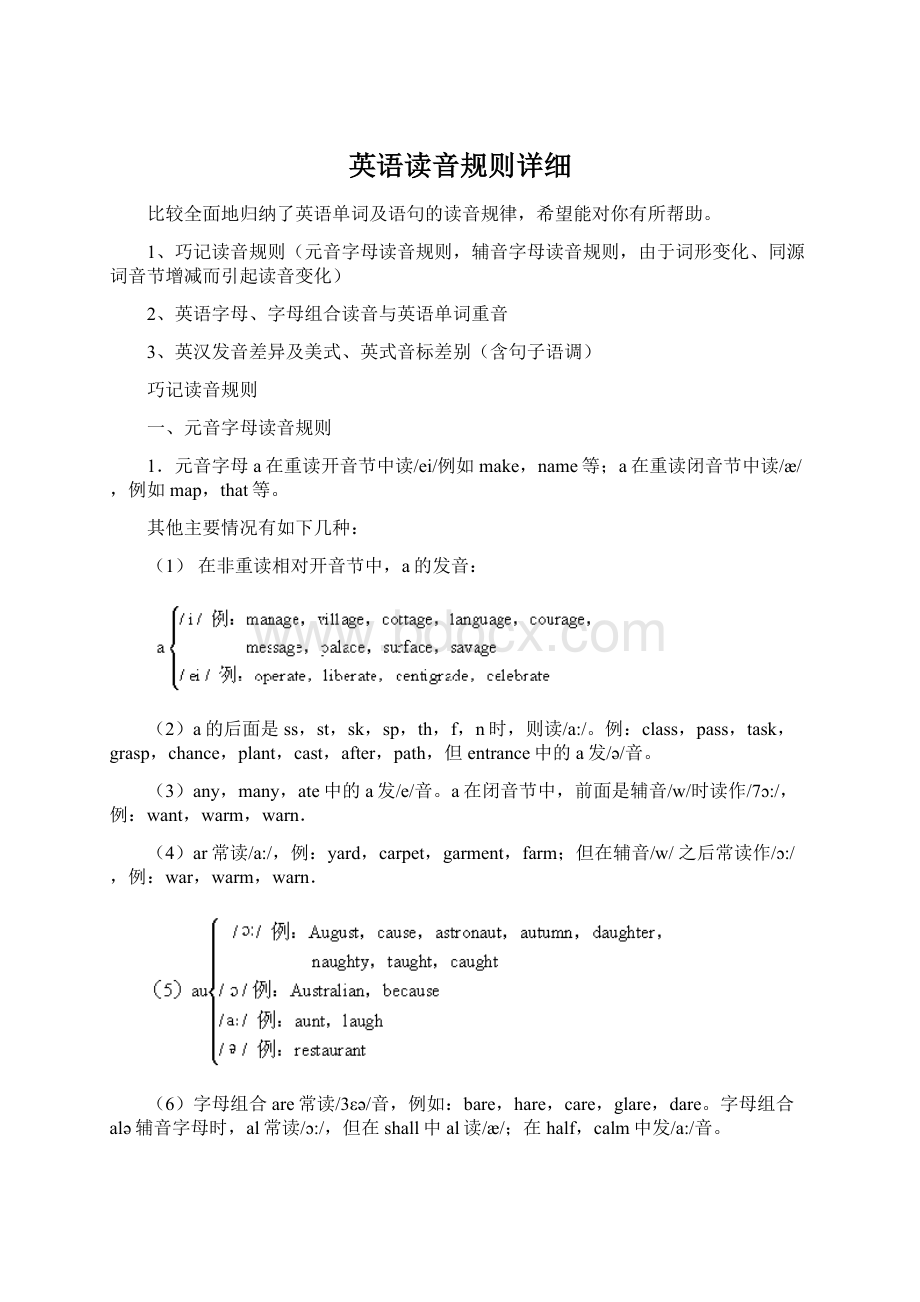英语读音规则详细Word格式.docx
《英语读音规则详细Word格式.docx》由会员分享,可在线阅读,更多相关《英语读音规则详细Word格式.docx(67页珍藏版)》请在冰豆网上搜索。

例如:
exact,exam,example,exist。
b.以字母组合ex开头的词,若ex后接一个辅音字母,且重音不落在第一个音节上,则ex读/iks/。
excuse,expect,exchange,except,experience,experi-ment,explain,expose,express,expression,expensive,extend,extraordinary。
c.以字母组合ex开头的词,无论ex后跟着什么字母,只要重音(包括次重音)落在第一个音节上,则ex的发音即为/eks/。
exercise,expert(专家,能手),extra(额外的),exhibition。
3.元音字母i在重读开音节中读/ai/,例如:
nice,drive,quite,line,polite,apologize,wise。
i在重读闭音节中读/i/,例如:
arithmetic,benefit,habit,English,equip。
(1)字母组合ie一般读/i:
piece,field,thief,achieve;
有时读/ai/,例:
lie,die;
但friend/frend/,review/ri’vju:
/,quiet/kwaiət/例外。
(2)字母i在climb,flight,fight,blind,kind,mind,find,frightful,design,sign,wild等含有igh,ign,ind,ild的词中,i发/ai/。
(3)April,impossible中的i发/ə/。
(4)pencil,business,medicine中的i不发音。
(5)在quiet,society,empire,entire,violin,diary,lion,wire,tire,giant,dialogue中元音字母i的字母组合读音均为/aiə/。
(6)字母组合ai在重读时一般发/ei/,但在captain,mountain,portrait,foun-tain中的ai发/i/,在curtain中的ai不发音。
4.元音字母o在重读开音节中读/əu/。
whole,home,rope,hope;
在重读闭音节中,读/ɔ/,例:
foreign,dollar,borrow,forehead,cost,tomorrow,common,province,model,modern,cough,forest,honour,proverb,probably,promise,beyond,modest,honest,stocking;
但在improve中的o读/u:
(1)在post,most,clothes,both,host,progress,total,won’t,soldier,gold,robot,poster,roll,control,scold,hotel等词中的o发/əu/音。
(2)o在n,m,v,th之前常读/}/,例:
month,front,son,ton,none,tongue,wonder,dozen,among,above,comfort。
(3)在tomb中的o发/u:
(4)字母组合oo在一般情况下读/u:
shoot,loose,pool,moon,choose,balloon,smooth,cool,food,fool,school,tooth。
但在k前,有时在t,d前,由它们构成的合成词、派生词中均发/u/,例:
cook,good,foot,look,wood,stood,took。
book在由room构成的合成词中也发/u/;
但应注意例外,例:
blood,flood中的oo读/}/。
(5)字母组合or在辅音/w/之后一般读/ə:
word,worm,world,work,worth,worthy,worse,worst,worship。
(6)以字母o开头的词中o的读音:
(7)字母组合ow的读音:
(8)字母组合ou的读音:
5.元音字母u在重读开音节中读/ju:
refuse,use,amuse,diffuse;
在重读闭音中读/}/,例:
bus,bump,suddenly,hundred,suffer,funny,study。
(1)r,l,j等加u的开音节中,u读/u:
blue,conclude,truth,truly,salute,rule,June。
(2)u在ll,sh之前,在f,p,b之后读/u/,例:
full,push,pull,sugar,bullet,bush。
(3)在difficulty,suggest,supply,success,industry,column,support中的u发/ə/。
(4)在busy,minute,business中的u发/i/;
但在guest,bury中的u读/e/。
(5)字母组合ur常发/ə:
/音,例:
burden,turn,burst,curtain,curl,fur,furnish,nursery,furl,furniture(家具)。
二、辅音字母读音规则
1.字母b一般读/b/,但在climb,comb,tomb,debt,doubt中位于m后或t前,这时b不发音。
2.字母n发/n/,例:
fine,cent;
词尾是mn时,n一般不发音,例:
autumn,col-umn;
字母n在/k/、/g/音前发/ŋ/,例:
thank,language,bank,anxious,English。
3.字母组合ng在词中时,一般发/ŋg/,例:
longer,stronger,language,但在engineer,danger,change,orange之中的ng却读/ndʒ/。
但sing变为singer时,却读作/siŋə/。
4.-sian,-cian,-sion,-tion的读音
(1)词尾-sian,-cian读/ʃən/,这样的词主要有:
Asian,ŋussian,Prussian,musi-cian等。
(2)词尾tion(sion)发/ʃ(ə)n/,例:
education/edju(:
)’keiʃən/,discussion等;
但-tion在字母s后发/tʃən/,这样的词主要有:
question,suggestion;
-sion在元音字母后发/{ən/,主要有:
conclusion,decision,revision,television等。
5.wh在一般情况下读/hw/,例:
white,wheat等,但wh在o前却读/h/,例:
who,whom,whose,whole。
8.字母组合ch一般读/tʃ/,但在源出希腊语的单词ache,character,chemical,chemist,chemistry,school,stomach,technical,technique,technology中,ch发/k/。
而在moustache中的ch读/ʃ/。
9.qu读/kw/,例:
require,quick。
10.以“thəs”或“thə’s”结尾词的读音
(1)在长元音和双元音后,“ths”或“th’s”读作/δz/。
path/pa:
θ/→paths/pa:
δz/
bath/ba:
θ/→baths/ba:
mouth/mauθ/→mouths/mauδz/
(2)在短元音或辅音(包括rth)后,ths或th’s读作/θs/。
months/m}nθs/,lengths/leŋθs/
births/bə:
s/,breaths/breθs/
(3)英语中有少数词中的ths既可读/θs/又可读作/δz/。
三、由于词形变化、同源词音节增减而引起读音变化
字母组合gh的读音规则
gh字母组合的读音在中学英语课本中归纳起来主要有“发音”和“不发音”两种情况。
一、gh在下列三种情况下发音
1.gh在词首时,读作/g/。
ghost/gəust/
2.词首为字母1,且后跟字母组合augh时,gh读作/f/。
laugh/laa:
:
;
f/,laughter/’laa:
ftə/
3.词尾为字母组合ough时,gh读作/f/。
enough/i’n}f/,cough/kɔf/,rough/rʌf/,tough/tʌf/
二、gh在下列五种情况下不发音
1.gh在元音字母i后不发音。
bright/brait/,fight/fait/,frighten/’fraitn/,high/hai/,light/lait/,might/mait/,night/nait/,right/rait/,sight/sait/,slight/slait/
2.gh在元音字母组合ei和ai后不发音。
eight/eit/,eighth/eitθ/,neighbor/’neibə/,straight/streit/,weigh/wei/,weight/weit/
3.gh在字母组合ought中不发音。
bought/bɔ:
t/,brought/brɔ:
t/,fought/fɔ:
t/,thought/θɔ:
t/
4.字母组合augh前面不是1时,gh不发音。
caught/kɔ:
t/,daughter/’dɔ:
tə/,naught/nɔ:
t/,naughty/’nɔ:
ti/,taught/tɔ:
5.词尾为ough的词,如以上所述,有的发/f/,但有时也不发音。
although/ɔ:
l’δəu/,plough/plau/,through/θru:
/,though/δəu/,thorough/’θʌrə/
注意:
若gh不是字母组合,而是分属于前后两个不同的音节时,不适合以上规则。
dininghall/’dainiŋhɔ:
l/
字母组合th的读音规则
现就中学英语课本中出现的含有字母组合th的单词,进行分类归纳,对其在单词中的读音总结以下几条。
1.在th后以字母-er结尾的单词中,th读浊辅音/J/。
altogether/ɔ:
ltə’geJə/,farther/’faJə/,feather/’feJə/,
whether/’weJə/,either/’aiJə/,gather/’gJə/
2.一般情况下,在代词、冠词、介词、连词或副词中的字母组合th,读浊辅音/J/。
within/wi’Jin/,without/wi’Jaut/,these/Ji:
z/,therefore/’>
Jεəfɔ:
/,al-though/ɔ:
lJəu/,those/Jəuz/,the/Jə/,thus/Jʌs/
发音特殊的单词:
through/θru:
/,throughout/’θru:
aut/
3.字母组合th在数词(包括基数词和序数词)中读清辅音/θ/。
three/θriɔ:
/,thirty/’θə:
ti/,thirteen/’θə:
’ti:
n/,
third/θə:
d/,fourth/fɔ:
θ/,fiftieth/’fiftiiθ/,
thousand/’θauzənd/,hundredth/’hʌndrədθ/
4.除上述单词外,一般位于词首的th读/θ/。
theatre/’θiətə/,thick/θik/,thin/θin/,throat/θrəut/,theory/’θiəri/,thrust/θrʌst/,thread/θred/,thorough/’ʌrə/,Thursday/’θə:
zdi/
5.以th结尾的单词,th读清辅音/θ/。
truth/tru:
θ/,worth/wə:
θ/,breath/breθ/,both/bəuθ/,cloth/klɔθ/,path/pa:
θ/,wealth/welθ/,length/leŋθ/,strength/streŋθ/
发音特殊的单词,例:
smooth/smu:
J/
6.在复合词中,th的读音与在原词中的读音相同。
something/‘sʌmθiŋ/,anything/’eniθiŋ/,nothing/’n^ʌθiŋ/
还有前面提到的within,without等。
7.其他无规则可循的词分列如下:
maths/m^æ
θs/,arithmetic/ə’riθmətik/,clothing/kləuJiŋ/,
clothes/kləuJz/,southern/’sʌJən/,northern/’nɔ:
Jən/,
worthy/’wə:
Ji/,author/’ɔ:
θə/,sympathy/’simpəθi/
/ŋ/与/ŋg/的读音区别
位于词中间的字母组合ng,有时读作/ŋ/,有时读作/ŋg/。
singer/'
siŋə/,ringing/'
riŋiŋ/,anger/'
æ
ŋgə/,stronger/'
strŋgə/。
这种ng什么情况下读作/ŋ/,什么情况下读作/ŋg/呢?
其规律是:
1.ng位于词的中部,ng后边的部分本来就是该词的一部分,而不是根据某种变化需要加的后缀。
这时ng读作/ŋg/。
finger/fiŋgə/,hunger/hŋgə/,hungry/hʌŋgry/,linger/lingə/,England/'
iŋglənd/,English/'
iŋgliʃ/,Hungary/'
hʌŋgəri/,language/'
læ
ŋgwidʒ/,lingual/'
liŋgwəl/,distinguish/dis'
tiŋgwiʃ/
2.以ng结尾的形容词变比较级和最高级加-er或-est后,词中的ng读作/ŋg/。
longer/'
lʌgə/,longest/'
lɔŋgist/,stronger/'
strɔŋgə/,strongest/'
strɔgist/,younger/'
jʌŋgə/,youngest/jʌgist/
3.以ng结尾的动词和名词因某种变化需要加上后缀后,词中的ng仍读作/ŋ/。
things/θiŋz/,singer/'
siŋə/,hanger/'
hæ
ŋə/,hanged/hæ
ŋd/,singing/'
siŋiŋ/,ringing/'
riŋiŋ/,clinging/'
kliŋiŋ/
4.如果一个词既可作动词(或名词),又可作形容词,它作动词或名词时加后缀以后,词中的ng仍读作/ŋ/;
它作形容词时加-er或-est后词中的ng读作/ŋg/。
long(v.渴望)longing/'
lɔŋiŋ/,long(a.长的)longer/'
lɔŋgə/
-(e)s和-(e)d的读音规则
一、大部分可数名词的复数及动词第三人称单数的一般现在式,是以-(e)s结尾的,如:
moths,glasses;
digs,teaches等。
其读法是:
1.在清辅音后读/s/。
months/mʌnθs/,cakes/keiks/,stops/stɔps/,laughs/la:
fs/
2.在浊辅音及元音后读/z/。
girls/gə:
lz/,pictures/'
piktʃəz/,potatoes/pə'
teitəz/,reads/ri:
dz/,digs/digz/,cries/kraiz/
3.在/s/、/z/、/ʃ/、/tʃ/、/dʒ/等音后-es发/iz/。
glasses/'
gla:
siz/,bridges/'
bridʒiz/,noses/'
nəuziz/,teaches/'
ti:
tʃiz/,wash-es/'
wɔʃiz/
请注意下面这些词单复数的发音变化:
house/haus/→houses/'
hauziz/,mouth/mauθ/→mouths/mauJz/
二、规则动词的过去式和过去分词中的-(e)d读法是:
1.在清辅音(/t/除外)后读/t/。
asked/a:
skt/,helped/helpt/,watched/wɔtʃt/,laughed/la:
ft/
2.在浊辅音(/d/除外)和元音后读/d/。
livd/lived/,planned/plæ
nd/,pulled/puld/;
tired/taiəd/
3.在/t/、/d/后读/id/。
wanted/'
wɔntid/,sounded/'
saundid/
_________________________________________________________________________
s发/s/的读音规则
字母s的读音有/s/、/z/、/ʃ/、/{/这几种,下面主要讲讲发/s/音的几条规则。
一、s在词首时,除了sugar,sure以及sh组合发/ʃ/以外,其余一般发/s/。
surface/'
sə:
fis/,serve/sə:
v/,seven/sevn/,six/siks/,some/sʌm/,sign/sain/
比较:
design/di'
zain/
一般前缀,合成词不影响其读音。
s仍读成/s/。
unsafe/ʌn'
seif/,unsatisfactory/ʌnæ
ətis'
fæ
kətətəri/,roadside/'
rəudsaid/,teaspoon/'
spu:
n/,snowstorm/'
snəustɔ:
m/
二、两个s在词尾时读作/s/。
grass,glass,address,press,success,pass,miss,stress,across,swiss,puss,progress,process,kiss
三、词尾s在u后读作/s/。
bus/bʌs/,us/ʌs/,minus/'
mainəs/,abacus/'
bks/,plus/plʌs/,status/'
steitəs/,virus/'
vaiərəs/
四、在sis组合的弱读中,两个s都读作/s/。
emphasis/'
emfəsis/,analysisə='
nlsis/,thesis/'
θ:
sis/,crisis/'
kraisis/
五、s在字母c前常读作/s/。
muscle/'
mʌsl/,discipline/'
disiplin/,science/'
saiəns/
六、s在某些前后缀中读作/s/。
1.在前缀mis-,dis-中,s读作/s/。
mismanage/?
mis'
mæ
niDN/,misjudge/?
DNʌDN/,misbelieve/?
misbi'
l:
v/,disorder/di'
sɔ:
də/,disobey/disə'
dei/
2.在后缀-sive,sity,-self,-some,-sy中,s读作/s/。
expensive/ik'
spensiv/,intensive/in'
tensiv/,decisive/di'
saisiv/
yourself/jɔ:
'
self/,handsome/'
nsəm/,troublesome/'
trʌblsm/,tiresome/taiəsəm/,quarrelsome/'
kwɔrəlsəm/
七、s在清辅音前后常读作/s/。
1.s在清辅音前常读作/s/。
honest/'
ɔ:
nist/,newspaper/'
nju:
?
speip/,task/ta:
sk/,satisfy/'
sæ
tisfai/,grasp/gra:
sp/
2.s在清辅音后常读作/s/。
sportsman/'
spɔ:
tsmn/,works/wə:
ks/,stops/stɔps/,roofs/ru:
fs/.
八、词尾se在字母r,l,n后读作/s/。
horse/hɔ:
s/,nurse/nə:
s/,worse/wə:
s/,course/kɔ:
s/,universe/'
ju:
nivs/,pulse/pʌls/,else/els/,tense/tens/,sense/sens/
读/ei/音的字母(组合)规则
1.a在开音节中读/ei/。
face/feis/,plane/plein/。
再如:
placeracespacegradetradeagepagecakeshakelakemaketakewakesnakepaletalesalegamelamenameshamesameshapetapephaseKatefatehatedategatelatestateskateplatecavesavewaveslavebravebabyladylazypapernatureAsiaabletablenativeawakemistaketranslatepersuadepotato
2.a在tion前读/ei/。
nation/'
neiʃən/,station/'
steiʃən/。
relationsituationgraduationeducationpopulationinformationoperationlibera-tioncelebrationpronunciationcongratulationexaminationimagination
3.ai读作/ei/。
maid/meid/,remain/ri'
mein/。
waitwaiststraitstraightraisepraisetailfailsailnailrai